|
Welcome to the latest issue of the newsletter dedicated to the CANDOERs (Communicators AND Others Enjoying Retirement). This newsletter will be distributed quarterly. New issues will be posted on the Web for viewing on or about, January 15, April 15, July 15, and October 15.
The CANDOER Web site and newsletter may be viewed by going to the following URL: www.candoer.org
The success of this newsletter depends on you. I need contributors. Do you have an interesting article, a nostalgia item, a real life story, or a picture you would like to share with others? Do you have a snail-mail or an e-mail address of one of our former colleagues? If you do, send it to me at the following e-mail address:
candoercat@gmail.com
or to my snail-mail address:
Robert J. Catlin, Sr.
2670 Dakota Street
Bryans Road, MD 20616-3062
Tel: (301) 283-6549
Please, NO handwritten submissions.
This newsletter is available free on the Web to any and all who worked with or for members of DC, OC, IRM, IM, or LM.
This publication is available on the Web only.
None of the material in this newsletter has a copyright, unless otherwise noted. If you wish to print the newsletter and make copies to distribute to others, please feel free to do so.
The CANDOER News will be available in three formats: the first format will be as a Web Page; the second format will be as a PDF file; the third as a Microsoft Word document.
The PDF file (Adobe Acrobat) and Microsoft Word document will allow you to print the newsletter.
If you are unable to read the PDF formatted newsletter, you can go to www.adobe.com/products/acrobat/readstep2.html and download the FREE reader. When installed on your computer, it will allow the automatic opening of the PDF file.
Cat's Corner
At a recent CANDOER luncheon Rob Robinson lent me his copy of LIFE, dated May 24, 1937. This issue of LIFE contained a series of articles about the Department of State. I have copied these articles and several of the pictures for inclusion in this issue. Thanks Rob!
Another summer has come and gone and those of us above the North Carolina, South Carolina line have survived an earthquake and a hurricane, with little or no damage to our homes or selves.
Nancy had a couple knickknacks break when they bounced off the shelves during the earthquake. Other than that the only clean up we had was washing out my shorts (grin).
The only damage from the hurricane (Irene) was a broken limb on the big pine tree in our front yard.
PLEASE, I need more articles.
Letters to the Editor
The following was received from one of our new members.
Bob,
Could you please post this to CANDOERs?
www.findagrave.com/cgi-bin/fg.cgi
It is a respectful site where folks can leave messages at virtual grave sites of departed friends, relatives, and colleagues. You can also remain anonymous. It does not cost anything to join and you do not have to be a volunteer to join.
However, the site can always use volunteers to research and record graves at cemeteries in one's town or state. It is based on the contributions of volunteers that have a notebook, computer, map, and camera. It is by no means a complete database but it has grown a lot in the last couple of years thanks to the work of the volunteers.
Cheers,
Chandra Smith
Cordell Hull -- the secretary of state fixes his eyes on London
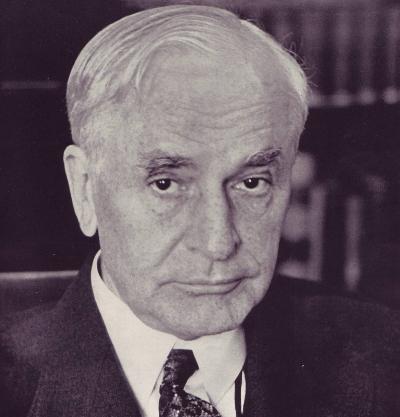
Cordell Hull occupies a post which has often, in the century and a half of U.S. history, been occupied by men of great brilliance. Mr. Hull, though his mind is shrewd and persistent, is not brilliant. Yet history may well place him among the most successful Secretaries of State. If it does, it will be because he has chosen one concrete objective and moved towards it with a singleness of purpose rare at any time and particularly rare in New Deal Washington.
Cordell Hull believes in foreign trade-as much as possible with as few restrictions as possible. His tools are reciprocal trade agreements. In four years as Secretary of State he has made agreements with 16 countries, including Canada and France. Lately he has laid the groundwork for what should be by far the most important trade agreement of all-one with Great Britain. Whether it goes through will depend largely on the action of the British Imperial Conference which began on May 14 at St. James's Palace in London. For the next four weeks Mr. Hull's mild but searching eyes will be fixed steadily on London.
Hull sets the course of American Foreign Policy
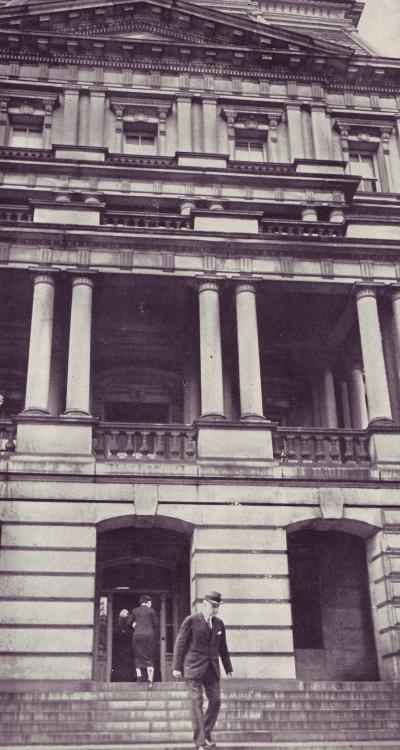
The foreign relations of the United States are conducted from an ugly stone building which is what President Roosevelt sees when he looks out of his office window. The Department of State is unlike any of the other bustling departments. Its atmosphere is peaceful and dignified. Crises are rare. From one administration to another, its cardinal policies do not change. They are two: to keep out of Europe (no entangling alliances) and to keep Europe out of the Western Hemisphere (the Monroe Doctrine). The New Deal has given it a third policy, which is really only a method of approach: the doctrine of the Good Neighbor.
At times the foreign policy of the New Deal has threatened to become explosive and spectacular, like other New Deal policies. But it never has, and many an observer thinks that the reason can be found in Cordell Hull's visits to the White House.
Secretary Hull took office at a time when the world's tariff barriers were higher than ever before in history. He said President Roosevelt on the slow, hard method of cutting them down by reciprocal agreements with each individual country. The method has brought results, trade with countries which signed the first agreements having increased twice as much as trade with other countries. The leading hold-outs among the nations have been Great Britain and the British Dominions except Canada. The Imperial Conference, now being held in London, will reconsider British trade policies, especially the system of Empire Preference which has been in effect since 1932, and may evolve a basis for bargaining with the U.S. To this end, Roosevelt and Hull recently entertained two of the conference leaders: Prime Minister King of Canada and Walter Runciman, president of the British board of Trade. The prospects for an understanding looked good when, on the first day of the conference, Mr. King made a speech urging close cooperation with nations outside the Empire to lower tariff barriers.
In these quiet corridors the old order rules
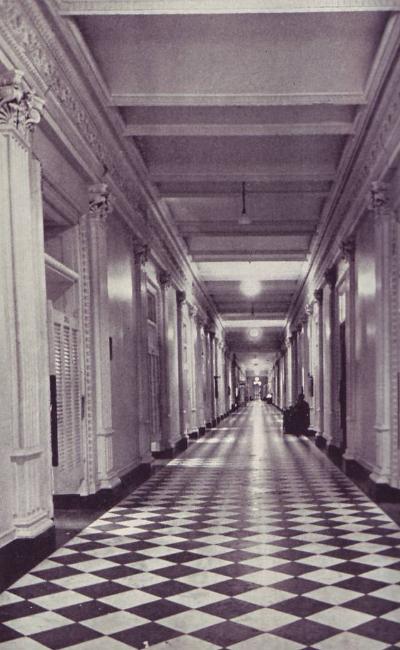
No spot in Washington has been less touched by changing times than the State Department. Diplomats still move slowly and gravely in its big, dim offices and interminable corridors. Negro messengers still sit at little desks which mark the important swinging doors. It is the stronghold of a scrupulous civil service, from the suave, immaculate career diplomats at the top to the clerks and messengers who grow gray and then white at their desks.
Here the bustle of the New Deal has not penetrated. Other Departments may grow and move to gleaming marble factories, filled with scurrying clerks and push buttons. Even the War Department, which shares the building, may fret for more glorified quarters. But the State Department will stay where it is, content with its mahogany doors, linoleum floors, bad lighting and great traditions.
State Department does business with due ceremony and secrecy
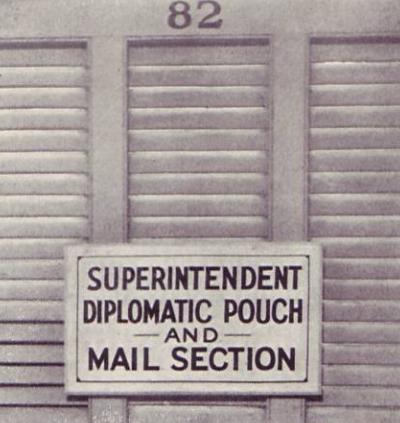 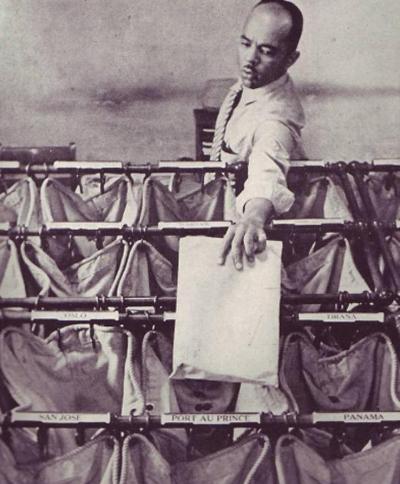
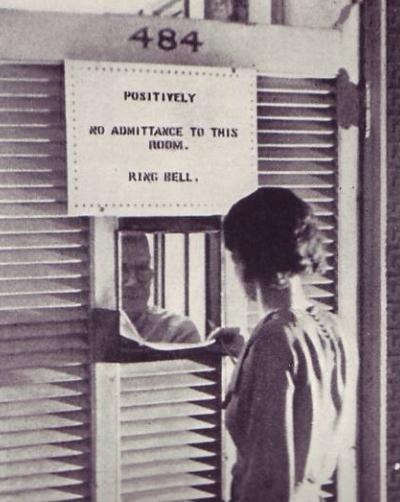 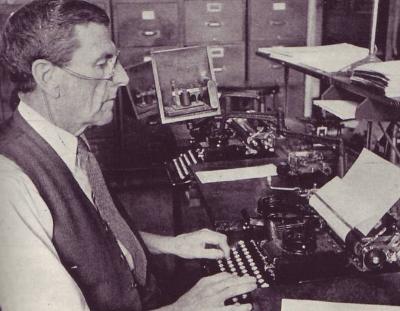
The business of the State Department is conducted with ceremony and secrecy. Documents have to be sealed, cables decoded, the most trivial letters sent by personal messenger or locked diplomatic pouch.
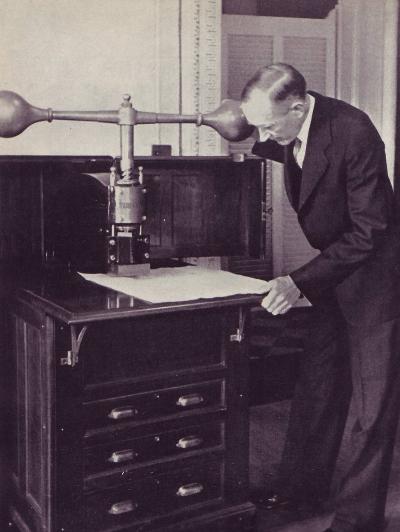
The Department's most impressive gadget is the Seal of the United States. It is used only on state papers bearing the President's signature, of which there are about 2,500 a year. The present die of the Seal is the fourth since the Republic began, the others having worn out.
Diplomacy requires an accurate, day-to-day knowledge of affairs in all the countries of the world. The Department does not rely on what it reads in the papers, but has a news service of its own, with diplomats as correspondents. Many a tiny nation, which has no important relations with the U.S., allows itself the luxury of an envoy in Washington because there it can find out what its own neighbors are doing.
In earlier days Ambassadors and ministers used to decide their problems on the spot, and then forward the information to the State Department later. Today, important questions are referred to Washington for decision by the Secretary of State or the President. Therefore, most State department messages go by cable. They are sent in code and decoded in a room where only code experts and high officials of the Department are allowed. This is the only room in the State Department which LIFE cannot show you.
The PAO's Girlfriends
by John Lemandri
The Public Affairs Officer (PAO) and his wife, who was our Political Officer, decided to take a week's vacation from their work in Baghdad and visit Ireland. Prior to departure, Tom left the telex number of the hotel where they would be staying should the need arise to call them. This presented a unique opportunity to get back at Tom for some of the tricks he played on me over the year.
The day after their arrival at the hotel, I sent a telex to Tom that read in part, "Darling, you've been gone only one day and I miss you terribly. Love Janet." The following day I sent a second telex to the same hotel which read, "Sweetheart, how can you leave me without saying goodbye. I miss your warmth at nights. Please return soon. Your Darling Michelle."
This went on for nearly a week with a different telex from a different girlfriend sent to the same hotel day after day. I could only imagine the look on the faces of the hotel staff who must have gotten a real kick from the love affairs of this real life Casanova. Fortunately for Tom and me, his wife thought it was hilarious and neither of us was shot.
A few weeks later it dawned on me that the Iraqis, who were monitoring our telex communication, must have went nuts trying to figure out who all these extra women were at the U.S. Interest Section since none were ever authorized entry into the country.
My Memories of Benghazi and Qaddafi
By Richard Kalla
As I write this, news sources overflow with reports about the downfall of the Qaddafi regime in Libya. The remaining Qaddafi loyalists and the paid mercenaries as well as the ever shrinking loyal military forces kept retreating from the advance of the rebellious citizen army that was finally fed up with the excesses and cruelty that had come to symbolize the repressive nature of their one-time liberator, Colonel Qaddafi. The rebels were assisted in their efforts by NATO air superiority that assured that the skies over Libya were free from Government planes. NATO air forces, including those from the U.S. at the beginning of the campaign, also bombed ammunition dumps and Government missile and artillery positions and strafed Government troops. The final battles for control were fought in the capital city of Tripoli. As usually happens in these types of overthrows, the cruelty and loss of civilian life was horrific. Now the real fun begins as the rebels work to determine what type of government they want to lead them back on the world stage. Will they be strong enough to mold something permanent that will gain support from their fellow citizens or are they destined to keep fighting to throw off petty dictators and other strongmen bent on assuming the yoke of power. Only time will tell.
One of the perks and probably drawbacks of a long Foreign Service career is the memories that we retain after serving at different locations over the years. Every once in a while one of those posts that we remember somewhere in the recesses of our mind becomes newsworthy and reminds us of a different time. For me, today's battles in Libya are that reminder. I was in my mid-twenties and newly married when I was sent to the American Embassy Office in the sleepy city of Benghazi, Libya in early 1968 for my second F.S. posting. Benghazi, in those days, was a one-man post for communicators with just enough work to keep one person busy, but not horribly so.
The country, at that time, was ruled by King Idris, who had returned from exile in Cairo many years before and had overseen the removal of the yoke of colonialism and the establishment of the new country of Libya. King Idris was a fairly benevolent ruler who showed compassion for his fellow countrymen. Newly discovered oil wealth was helping to bring a mostly nomadic society into the 20th century. It was slow going, but the king had established a fairly secular Government that resisted the theocracy that is often present in Islamic nations. Islamic scholars may differ with my view, but that was what I thought at the time.
On Labor Day morning in 1969, my wife Pat and I were awakened by the sound of gunfire right outside our downtown Benghazi apartment. Rushing to the windows, we saw gunmen in the streets shooting their weapons in the air and noticed a machine gun nest that had been set up directly adjacent to the bedroom of our newborn daughter, Karen. This was the start of the military overthrow of the King Idris reign in Libya. Led by a 28-year old army Lieutenant, Muammar Gaddafi, the army soon took control of the military bases and imposed a month-long curfew for most of the day and night. King Idris was in Cairo at the time for his yearly vacation. He never returned.
I have many memories of that time that I still think about. About taking my way out of the locked down Embassy Office to run to my apartment to warn my wife that a mob was coming down our street breaking windows etc. along their route; about convincing the Libyan Army guard, who spoke no English, to let me back into the Embassy Office; about personally meeting Qaddafi in the Principal Officer's office and shaking his hand when I delivered the word that the U.S. would recognize his new regime. But, what strikes me most about that time and the overthrow was that it went fairly peacefully when comparing it to this latest coup. There were, of course, rumors that some of those in high places met with an untimely end but, for the most part, the citizenry went unharmed.
Of course the Qaddafi of 1969 was a far cry from the tyrant and terrorist that he later became and the lot of foreigners, particularly Westerners, was to change drastically with the rise to power of Qaddafi. Under King Idris, many street and shop signs were in English as well as Arabic. This all changed shortly after the coup. Islamic fundamentalism also became more prevalent and the personnel stationed at the sprawling U.S. Air Force Base, Wheelus, soon became persona non grata as did the staff of the Embassy Offices in Baida and Benghazi and, eventually those assigned to the Embassy in Tripoli.
Approximately four months after that Labor Day morning, my small family left Libya for good on our way to a new assignment in Bonn, Germany. Over the years since then, Libya has often been in the news, usually for unpleasant reasons such as the Lockerbie bombing, etc. I was also 28 years old, like then Lieutenant Qaddafi on that Labor Day morning when it all started. It has been nearly 42 years since I had that brief encounter with the tall slim Lieutenant that would become such an iconic world figure and despotic leader and international terrorist. But there was no way to guess what was to come on that fall day in 1969. Libya was just a small insignificant country that had little arable land with an encroaching desert that left only a small slice near the Mediterranean Sea that was really habitable. Maybe young Lieutenant Qaddafi understood the importance of what the black gold being pumped out of the wells by foreign companies could provide and maybe he was even then planning to use its newfound wealth as a means to foment terrorism, but there was no indication of that then. As I write this, Qaddafi is being hunted by his own people and has a price on his head; a fitting end to one so obviously corrupted by power. As the saying goes, "You reap what you sow."
Take care and be safe!
See you next quarter!
|









